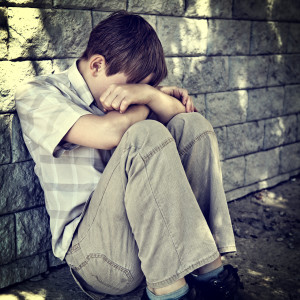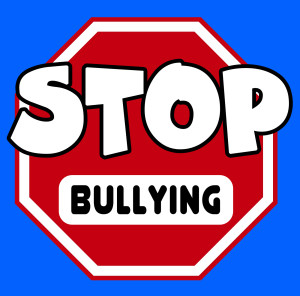*Names have been changed to protect the not so innocent.

I walk in the door after work and a commute. My feet barely over the threshold and I hear, ” Bobby took the dodge ball…..he’s such a jerk.” I have been hearing about Bobby all year long.
At this point I have to agree Bobby is a jerk. I can’t really say that to my little guy though now can I? Though I admit I have nodded in agreement on more than one occasion. Anyway, my little guy is frustrated and talking to me about it because he knows that he is not allowed to be mean to this kid in return. He is expected to follow rules, and to not excessively tattle. He feels his hands are tied and that this other kid gets to run amok.
There is another child in the class we will call her Sarah. She is bossy, always telling the other kids what to do, pushing her way through a crowd, and demanding attention.
Every class has a Sarah and a Bobby. We can’t teach our children to be mean to them. We certainly do tell them to keep their distance from them though, and that they do not need to play with them. This is so ambiguous to kids. They have legitimate reasons to not like these other children, as much as we have the right to not like certain coworkers.
It is difficult however to give them any good advice about how to deal with the situation. We tell them to keep their distance, but they are not really allowed to tell them they cannot join their game. Whats more is that I don’t want to teach my child to tell them they can’t play or to tell them to go away. That is not a skill set that will serve them later in life. That is not the skill set of success and leadership. It is all well and simple to say just stay away from Sarah but next week perhaps Sarah’s desk will be right next to my little guy. Maybe Sarah will have her elbow on his paper and be asking to borrow his eraser.
Now what…well that whole eraser business really happened. I got an earful about how hard Ms. srah is on erasers and how she has her pretty rainbow one but wanted to use his saying she lost hers so she could keep it pretty. My little guy told her she had her eraser. Then the epitomy of insults after his was all soiled and rubbed down he sees hers right at the front edge of her desk. The horror. The insult. The 1st grade anger.
It was at this point that I realized I had underestimated the impact a bossy pushy little girl could have on my little guy. Up to this point I had only concerned myself with the dodgeball thief and cheating Bobby. I had left my little guy ill prepared.
So Now What…Another BIG Conversation
We sit and we talk. We talk not about the wrongings that have occurred but about who Sarah and Bobby are. We talk about what is good about them and we talk about what makes my little guy crazy.
We talk about strategies and implementation. We talk about motivations.
Little Guy needs to understand how fortunate he is to be emotionally balanced, socially skilled, smart, and well liked by his peers.
Just the appreciation of all of his own strengths helps distance him further from the deficits expressed by these more difficult peers.
In Bobby’s case he struggles with physical and emotional immaturity. He feels very much left out by the boys who are more in synchrony with each other. My guy is eager to explain that they never tell him he cannot play or tease him. This gives me the opportunity to reassure him that he is not doing anything wrong. It also gives me the opportunity to explain how it would feel if he felt like the other guys let him play but he still felt like they did not like him as much as they liked each other. At that point I could almost see a light bulb go on for him. It was at that moment that he realized that every time he felt annoyed by Bobby that Bobby felt it too.
Through Someone Else’s Eyes
As we talked more we talked about how Bobby is likely feeling when he is mean. How Bobby feels like he does not fit in well with the other boys. At no point would I excuse Bobby’s actions but rather the focus is more on understanding Bobby’s struggle and internal motivations.
In turn this allowed my little guy to focus less on how he felt repeatedly wronged by Bobby and more on how fortunate he is to have the social skills and great friends that he has. In the end isn’t it better to be the guy who shows up to school being greeted by friends, but having a dodge ball stolen from your game, than to be the guy who has to ask to join a game then steal the ball because you are feeling awkward and frustrated. A little perspective goes a long way, even for kids. It can take some time but that is a big life skill. Being able to step back from your anger and look through the other person’s eyes.

Toned Photo of Sad and Stressed Kid sit by the Wall outdoor
Kill em with kindness kiddo- because the mean ones truly do need it the most.
I can happily report that after this conversation, my little guys interactions with Bobby became less frustrating. There are moments when Bobby’s behavior angers my guy. But now he is able to better understand where Bobby is coming from. I think his willingness to join the game comes across as more genuine and he displays a greater empathy towards Bobby that in turn decreased Bobby’s acting out behavior.
I like to think that maybe changing his understanding of Bobby’s trouble, changed the way he responded to Bobby. That may have in turn changed how the other boys responded to Bobby. My sincerest hope is that in turn Bobby was happier as well. I don’t know, but it is an exhilarating thought that teaching empathy and insight to one person can improve the interactions of many. It is the power of positive leadership as seen in a microsystem.
Personal Boundaries
Do you have to like everyone? Nope I sure don’t.
Do you have to share??? Well yeah but…
The world is complicated. My guy can’t control that his desk was put by Sarah. He can’t refuse to share the school’s dodge ball with Bobby. But he can refuse to share his eraser. He can ask that she move her elbow off of his paper. Personal boundaries. We need to teach kids to identify where they want their boundaries to be, discuss what is appropriate, and teach kids how to assert them. In this case the boundary of the desk perimeter and the sanctity of his personal school supplies.
If a child is consistently given the message of sharing it is good, up to the point when they feel wronged by what they see as an absence of permission to say no.
So we role play. I ask him if I can borrow his eraser. At first he starts with a “no use your own.” We work on crafting it until he can say it assertively but kindly. We ended up at, “No, I am trying to keep mine nice. The teacher has extra.” Next we worked on his personal physical boundary- the desk,” Please don’t come into the space of my desk, it is my area.”
I was so impressed when I asked my little guy if this had worked the next day. He said that it had! He said Sarah was sprawled with her arm across his desk, and he asked her to stay in her space calmly as we had practiced. He said that she had given him a mean look, but had not intruded into his space again all day.
I love life lessons with immediate impact. To think that one day he just might be setting limits with a coworker, employing the skill I taught him when he was 6 is just amazing.

A octagonal Stop sign in red and white with Bullying caption on a blue background.
When to Involve Teachers
Seems simple enough to tell our kids to just tell the teacher or recess proctor right?… but is it? Not for kids. We tell them not to tattle, their friends tell them not to tattle. But now what? A kid just stole your ball. A kid just pushed you. A kid just called you a name. When is it time to get help?
Well the first step is teaching them solid ways to try to address problems on their own. How to assert personal boundaries, how to understand the intentions of others, and how to appropriately share.
If the child is confident in the skills they have been given, to address situations with peers as they arise, then they will be more confident in seeking assistance when those efforts fail.
In my conversations with my little guy we have discussed the need to engage teachers if another child is physically aggressive or if his skills of boundary setting and empathy have not been successful. Furthermore, to engage teachers if bullying is occurring after addressing the bullying behavior directly. For more about bullying prevention and intervention read more here.
There will always be kids my kid dislikes. That is OK. People are all different and we are not all meant to be best friends.
If we teach our kids to take the time to try to understand others and respect them- If we teach our kids to take the time to understand themselves and assert their personal boundaries- Maybe we can build a more harmonious existence for the wide variety of people with whom we share the playground of life.

Shannon
Latest posts by Shannon (see all)
- Social Anxiety: More Than Shy - July 10, 2016
- 3 BIG Reasons To Give Children Specific Meaningful Praise - June 27, 2016
- Protecting Children From Sexual Predators: Safety Without Paranoia - June 6, 2016


Leave a Reply